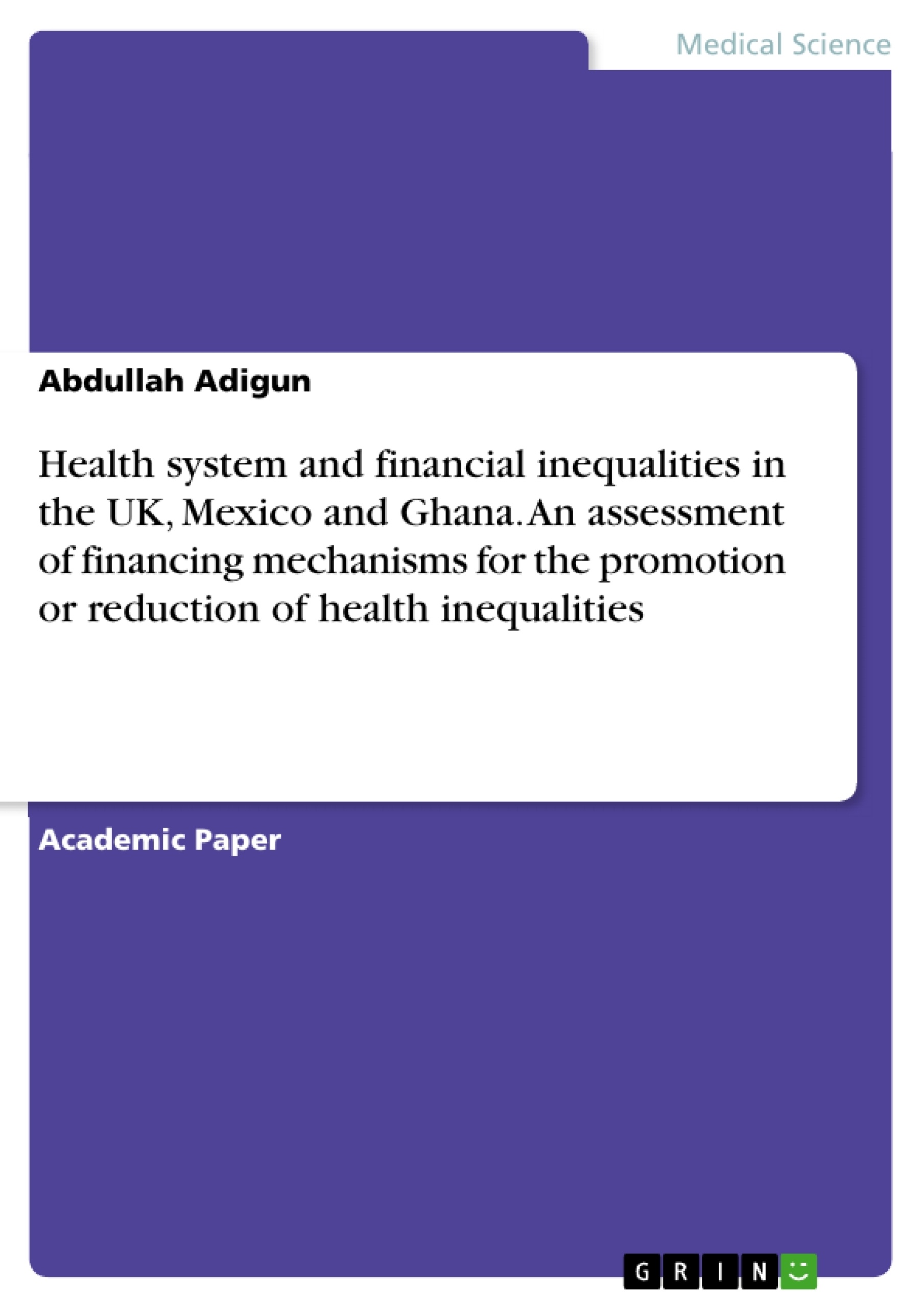The objective of this report is to conduct a critical and comparative analysis of UK, Ghana and Mexican health system with special emphasis on financial inequalities discerned. The World Health Report, 2000 recommends that the global health care system performances has to be assessed by the average health of the population as well as by how citizen’s health status and the financial burden of health care is evenly distributed among the population.
This dominant concern with equity is reflected in many modern directives on health, all in an attempt to present an equitable system without financial preference on a global scale. For individuals at the top of the socio-economic spectrum, the multiple mechanisms adopted by UK, Ghana and the Mexican health systems provide excellent care according to any standard. But for the citizens at the bottom of such social distributions, system delivers a little more than a vaccination.
Inhaltsverzeichnis (Table of Contents)
- Introduction
- Financial Mechanisms in the UK
- Financial Mechanisms in Ghana
- Financial Mechanisms in Mexico
- Reducing Health Inequalities in Ghana: Recommendations
- Conclusion
- References
Zielsetzung und Themenschwerpunkte (Objectives and Key Themes)
This report aims to critically compare and analyze the health systems of the UK, Ghana, and Mexico, with a particular focus on financial inequalities. The report examines the mechanisms implemented in each country to address health inequalities, exploring their effectiveness and limitations.
- Financial mechanisms for health inequalities in the UK, Ghana, and Mexico.
- The effectiveness of policies and programs aimed at reducing health disparities.
- The impact of socio-economic determinants on health outcomes.
- Comparative analysis of different approaches to tackling health inequalities.
- Recommendations for improving health equity in Ghana.
Zusammenfassung der Kapitel (Chapter Summaries)
- Introduction: This chapter provides a general overview of the issue of health inequalities and the importance of equity in healthcare systems. It highlights the World Health Report, 2000, which emphasizes the need for equitable distribution of health services and financial burden.
- Financial Mechanisms in the UK: This chapter examines the UK's approach to addressing health inequalities. It discusses the Black Report (1980) and the Acheson Report (1997) as well as their impact on policy and practice. The chapter also explores the role of government policies and initiatives in tackling health disparities.
- Financial Mechanisms in Ghana: This chapter focuses on the financial mechanisms employed in Ghana to address health inequalities. It examines the strengths and weaknesses of these mechanisms and explores the challenges faced by the country in achieving health equity.
- Financial Mechanisms in Mexico: This chapter analyzes the financial mechanisms utilized in Mexico to promote health equity. It discusses the country's health system and the strategies employed to address health disparities. The chapter also explores the effectiveness of these mechanisms.
- Reducing Health Inequalities in Ghana: Recommendations: This chapter presents recommendations for improving health equity in Ghana, based on the analysis of the country's financial mechanisms and health system.
Schlüsselwörter (Keywords)
The report focuses on key concepts such as health inequalities, financial mechanisms, socio-economic determinants, comparative analysis, health equity, and policy recommendations. It explores the impact of different financial mechanisms on health outcomes in the UK, Ghana, and Mexico, highlighting the challenges and opportunities for achieving health equity in these countries.
Frequently Asked Questions
How does the health system in the UK address financial inequalities?
The UK system, influenced by the Black and Acheson reports, focuses on reducing health disparities through government policies aimed at equitable distribution of services regardless of socio-economic status.
What are the main challenges for the health system in Ghana?
Ghana faces challenges in achieving health equity due to financial limitations and a gap in quality of care between the top and bottom of the socio-economic spectrum.
What was the significance of the World Health Report 2000?
It recommended assessing health systems not just by average health outcomes, but by how fairly the financial burden and health status are distributed across the population.
How does Mexico promote health equity?
Mexico utilizes specific financial mechanisms and strategies to provide care for citizens at various social levels, though disparities still exist for those in poverty.
What role do socio-economic determinants play in health outcomes?
Socio-economic factors are critical; individuals with higher wealth generally receive excellent care, while those at the bottom often receive minimal interventions like basic vaccinations.
- Quote paper
- Abdullah Adigun (Author), 2021, Health system and financial inequalities in the UK, Mexico and Ghana. An assessment of financing mechanisms for the promotion or reduction of health inequalities, Munich, GRIN Verlag, https://www.grin.com/document/1145708



